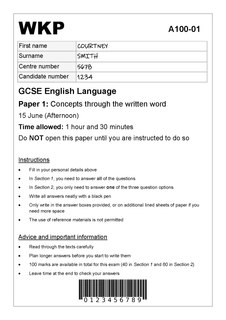
The General Certificate of Secondary Education (GCSE) is an academic qualification in a particular subject, taken in England, Wales, and Northern Ireland. State schools in Scotland use the Scottish Qualifications Certificate instead. Private schools in Scotland may choose to use an alternative qualification.

The University of Kent is a semi-collegiate public research university based in Kent, United Kingdom. The University was granted its Royal Charter on 4 January 1965 and the following year Princess Marina, Duchess of Kent, was formally installed as the first Chancellor.
Education in England is overseen by the United Kingdom's Department for Education. Local government authorities are responsible for implementing policy for public education and state-funded schools at a local level.

The Universities and Colleges Admissions Service is a UK-based organisation whose main role is to operate the application process for British universities. It operates as an independent charity, funded by fees charged to applicants and to universities, plus advertising income, and was formed in 1992 through the merger of the former university admissions system UCCA and the former polytechnics admissions system PCAS.
College and university rankings are rankings of institutions in higher education which have been ranked on the basis of various combinations of various factors. None of the rankings give a comprehensive overview of the strengths of the institutions ranked because all select a range of easily quantifiable characteristics to base their results on. Rankings have most often been conducted by magazines, newspapers, websites, governments, or academics. In addition to ranking entire institutions, organizations perform rankings of specific programs, departments, and schools. Various rankings consider combinations of measures of funding and endowment, research excellence and/or influence, specialization expertise, admissions, student options, award numbers, internationalization, graduate employment, industrial linkage, historical reputation and other criteria. Various rankings mostly evaluating on institutional output by research. Some rankings evaluate institutions within a single country, while others assess institutions worldwide. The subject has produced much debate about rankings' usefulness and accuracy. The expanding diversity in rating methodologies and accompanying criticisms of each indicate the lack of consensus in the field. Further, it seems possible to game the ranking systems through excessive self-citations or by researchers supporting each other in surveys. UNESCO has questioned whether rankings "do more harm than good", while acknowledging that "Rightly or wrongly, they are perceived as a measure of quality and so create intense competition between universities all over the world".

A student loan is a type of loan designed to help students pay for post-secondary education and the associated fees, such as tuition, books and supplies, and living expenses. It may differ from other types of loans in the fact that the interest rate may be substantially lower and the repayment schedule may be deferred while the student is still in school. It also differs in many countries in the strict laws regulating renegotiating and bankruptcy. This article highlights the differences of the student loan system in several major countries.
People & Planet is a network of student campaign groups in the UK. It is "the largest student campaigning organisation in the country campaigning to alleviate world poverty, defend human rights and protect the environment."
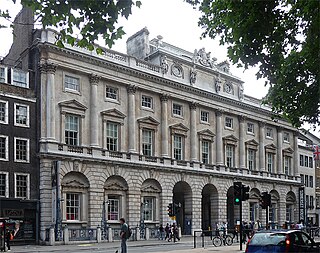
The Courtauld Institute of Art, commonly referred to as The Courtauld, is a self-governing college of the University of London specialising in the study of the history of art and conservation. It is among the most prestigious specialist colleges for the study of the history of art in the world and is widely known for the disproportionate number of directors of major museums drawn from its small body of alumni.
Tuition fees were first introduced across the entire United Kingdom in September 1998 under the Labour government of Tony Blair to fund tuition for undergraduate and postgraduate certificate students at universities; students were required to pay up to £1,000 a year for tuition. However, as a result of the new devolved national administrations for Scotland, Wales and Northern Ireland, there are now different arrangements for tuition fees in each of the nations.
Three national rankings of universities in the United Kingdom are published annually – by The Complete University Guide, The Guardian and jointly by The Times and The Sunday Times. Rankings have also been produced in the past by The Daily Telegraph andFinancial Times.

Varsity is the oldest of Cambridge University's main student newspapers. It has been published continuously since 1947 and is one of only three fully independent student newspapers in the UK. It moved back to being a weekly publication in Michaelmas 2015, and is published every Friday during term time.
The Research Assessment Exercise (RAE) was an exercise undertaken approximately every five years on behalf of the four UK higher education funding councils to evaluate the quality of research undertaken by British higher education institutions. RAE submissions from each subject area are given a rank by a subject specialist peer review panel. The rankings are used to inform the allocation of quality weighted research funding (QR) each higher education institution receives from their national funding council. Previous RAEs took place in 1986, 1989, 1992, 1996 and 2001. The most recent results were published in December 2008. It was replaced by the Research Excellence Framework (REF) in 2014.

The Higher Education Statistics Agency (HESA) is the official agency for the collection, analysis and dissemination of quantitative information about higher education in the United Kingdom.
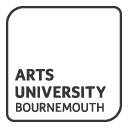
Arts University Bournemouth is a further and higher education university based in Poole, England, specialising in art, performance, design, and media. It was formerly known as The Arts University College at Bournemouth and The Arts Institute at Bournemouth and is the home of Bournemouth Film School
University College Dublin Students' Union is the students' union of University College Dublin. It is the largest students' union in Ireland.

Rochester Independent College (RIC) is an Independent Schools Council accredited co-educational, private day and boarding school, in Rochester, Medway, United Kingdom. It was established in 1984. The college is in the top 5% of schools in England for progress at A-level and a large proportion of its students gain entry to Russell Group universities. It has particular speciality in Science, Mathematics, and Literature.
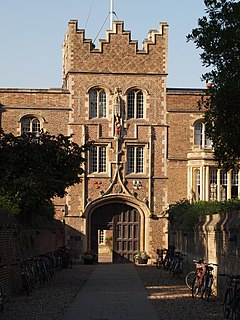
Jesus College is a constituent college of the University of Cambridge, England. The college's full name is The College of the Blessed Virgin Mary, Saint John the Evangelist and the glorious Virgin Saint Radegund, near Cambridge. Its common name comes from the name of its chapel, Jesus Chapel.

UTC Sheffield City Centre is a University Technical College (UTC) that opened in Sheffield city centre, South Yorkshire, England in September 2013. The site for the UTC was purchased by Sheffield City Council, with capital funding of £9.9 million awarded by the Department for Education for new buildings. The sponsors of the UTC include Sheffield Hallam University and The Sheffield College in Sheffield.
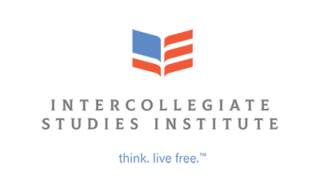
The Intercollegiate Studies Institute (ISI) is a nonprofit educational organization that promotes conservative thought on college campuses. It lists the following six as its core beliefs: limited government, individual liberty, personal responsibility, the rule of law, free-market economics, and traditional Judeo-Christian values.

The U.S. News & World Report Best Colleges Ranking is an annual set of rankings of American colleges and universities published by U.S. News & World Report beginning in 1983. They are the most widely quoted of their kind in the United States.












